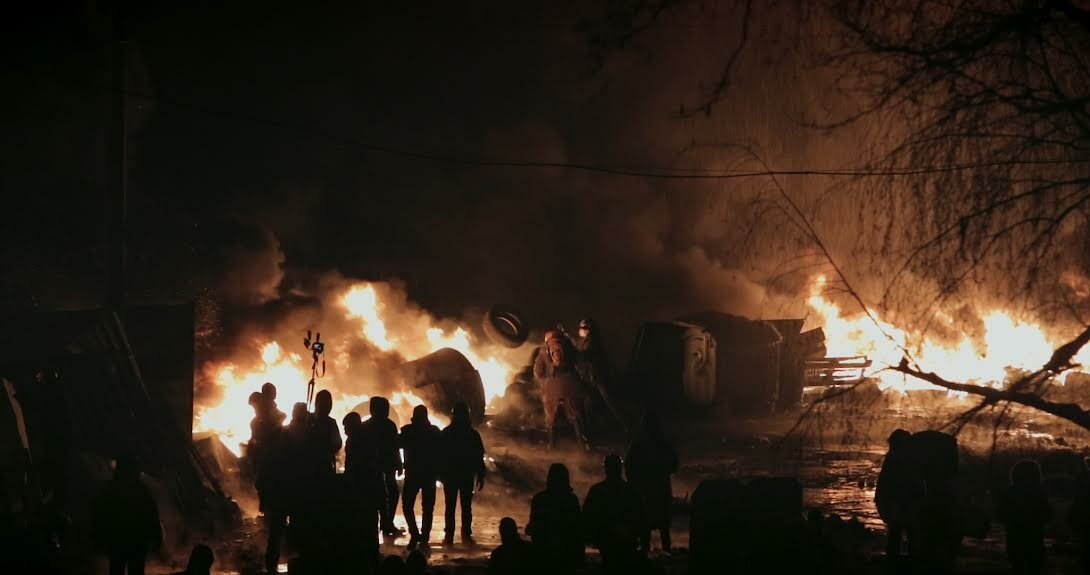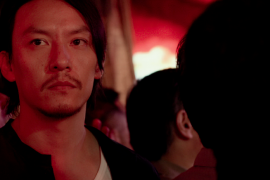Is it possible to film a revolution without becoming part of it? When bombs and tear gas are thrown at the camera, can a filmmaker remain objective and emotionally detached? Maidan’s creator has managed to do just that, taking us back to the roots of documentary filmmaking and giving us a pure example of Cinéma vérité.
Directed by: Sergey Loznitsa
Running Time: 133 minutes
In November 2013 Ukrainians gathered in Kiev’s Independence Square, known as ‘Maidan,’ to protest. They demanded closer European integration and the resignation of then-president Viktor Yanukovych, who had promised them to sign a political agreement with the European Union, but went back on his word after Russia’s embargo on Ukraine.
Maidan is the filmic documentation of the months-long protests, which escalated into a violent clash with the riot police, resulting in many human casualties and culminating into a revolution, causing Yanukovych to flee the country. Devoid of political propaganda, the film is a chronicle of life on the square, that may, on some level, display a spirit of camaraderie towards the people, but in no way is it seeking to alter beliefs or to exalt people into heroes.
The film opens with the shot of a crowd singing the Ukrainian anthem that may well function as an opening statement: this will be the story of a proud nation, which tries to break free from Russia’s sovereignty, and turns to Europe for help. It’s debatable, of course, whether breaking free is feasible or sensible, given their close economic dependence on Russia, but director Sergey Loznitsa is not here to make political statements, for or against the Ukrainian cause. He’s simply here to document a revolution.

“Glory to Ukraine! Glory to the heroes! Heroes never die!” Like a refrain from a song, these lines keep being repeated by the protesters throughout the film. This is their story: one of heroes struggling to overthrow an oppressive, Russian-friendly regime. Loznitsa’s camera, however, is not interested in hero-worship. It’s simply here to record everyday life on a square, during a revolution: preparing meals, keeping warm, building barricades, gathering ammunition, getting ready for attack, attending to the wounded, mourning the dead.
Since the director is recording only one side of the conflict, you are instinctively looking for instances of bias and subjectivity. Those instances, however, are elusive. The camera becomes part of life on the square, but never quite one with the people. It’s always there, but also outside looking in. It does not interact with the protesters, even though they know it’s there. There is no dialogue and no commentary, except for the live voice-over offered by political religious leaders, or activists speaking on the microphone. There is neither any dramaturgy. It’s not the director that shapes the narrative, but the events themselves; he is simply there to witness them and capture them.
Loznitsa records a revolution, but chooses not to become part of it. Such an approach may not make his film patriotic, as some would wish it to be, but it does make for objective documentary filmmaking. Like a fly on the wall, Loznitsa is simply observing, without intruding. His multiple cameras, which are spread out around the square, are detached, patient, fixed at a given long shot, relentless, at times, in their fixation, never zooming-in, quietly recording events as they unfold. There is no sentimentality here. The camera does not force you to feel anything. The truth depicted may be emotional and moving at times, and revolutions are, after all, very emotional, but the camera itself does not seek to sensationalize.
Maidan is ‘kino-pravda’ (‘film truth’) at its purest, reminding us that even revolutions can be looked upon with detachment, and that even amidst the insanity of violent conflict, Art can offer a sane historical document to reflect upon.




